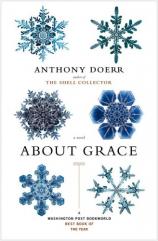Reading Group Guide
Discussion Questions
About Grace

1. In David's early life, he suffers the loneliness of the gifted. He struggles with the terror that his visions instill in him and is almost overwhelmed at the intensity of the natural world. What does he love and appreciate in his childhood? Do those elements remain in his life? Do you think he grows more or less lonely?
2. David's mother is the only person who seems unafraid when David's visions reveal themselves. Describe her approach to mothering an unusual child, one who sleepwalks and foresees terrible events. How does she help instill in him a sense of being loved? How do you think her loss affects him?
3. Sandy is searching for meaning in her life. She is bored and disappointed by her marriage and job, and a new life with David is a way to escape that. Ultimately, their affair leads to outcomes both good and bad. How does David help her find her identity? What do you think the rest of her life is like after David flees? If you were in her position, could you find a way to understand why David left?
4. When David leaves his family in Ohio, he is convinced that he must do so in order to save his daughter's life. Later, he wonders if he might have acted differently, if he could have stayed and altered the future as he saw it. What do you think? Was his running away an act of cowardice or of courage? What does he later learn about his visions that changes how he thinks of their inevitability?
5. David ends up in the Caribbean purely by chance. Why does David stay on the islands as he does? Why does he choose manual labor over work that would utilize his Ph.D.? Try to think of how his exile changes him. What does he gain by adopting this new lifestyle, and what does he lose?
6. Water is everywhere in the novel, from frozen Alaska, to flooding Ohio, to the gentle seas of the Caribbean islands. Doerr writes that "Water was a wild, capricious substance: nothing solid, nothing permanent, nothing as it appeared." In what ways does water heal and in what ways does it destroy? Think over some of the scenes in which water plays a major part. Why is David so fascinated by it?
7. How do the locations in the book represent different stages of David's evolution? Who is he in Alaska? In Ohio? In the Caribbean? How does the landscape around him reflect or affect his inner state? Think about how the natural world interacts with the narrative events of the book and the changing lives of the characters.
8. Consider some of the unexpected friendships that David acquires. Who is kind to him? Why do you think people such as Herman and the Orellanas help him? Is it simply out of compassion or is there something that he gives in return? Try to think about acts of kindness by David himself; is there a balance between what he receives and what he offers?
9. Naaliyah lives an extraordinary life, one that certainly exceeds what one might expect from a poor refugee from a remote island. What qualities aid her in her quest to become a scientist? What is her motivation to achieve so much? Consider what her success means to her family, and how her relationship with them is both damaged and strengthened along the way.
10. Naaliyah is David's muse and the guide back into his old life. Yet David's relationship with Naaliyah is tinged with sexual confusion and other potential dangers. How would you define their relationship? What role does David want her to have in his life? What role does she want to have? How do they help each other find their way in the world?
11. David's gift warps time, making it seem as though present and future are interchangeable. How does this knowledge affect the way he looks at the world? How does the added burden of memory, of the past, affect the way that he lives? Consider how focusing on the past or on the future affects his ability to live well at different points of the book. At the end of the book, what is he concentrating on? What place do his visions have in his new life?
12. From the perspective of others, David did something unforgivable: he abandoned his wife with their newborn daughter. At various points in the novel, he runs away rather than confronts, or chooses an indirect approach, or fails to take action. After twenty-five years, is David redeemed by his return? Does his persistence help as he tries to find a place in his family's life? What role does his family finally allow? Would you forgive him?
About Grace
- Publication Date: September 27, 2005
- Genres: Fiction
- Paperback: 416 pages
- Publisher: Penguin (Non-Classics)
- ISBN-10: 0143036165
- ISBN-13: 9780143036166









